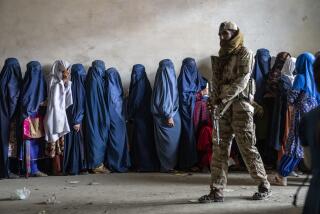U.N. Reviews Landmark Document on Women
- Share via
UNITED NATIONS — Declaring “our work is far from done,” First Lady Hillary Rodham Clinton on Monday challenged a U.N. review of a landmark 1995 women’s conference in Beijing to finish the work of equality between the sexes.
When she ended her speech, women’s activists and U.N. officials in the audience of several hundred spontaneously sang “We Shall Overcome,” the hymn of the U.S. civil rights movement that Clinton said has become a mantra for women’s groups in India.
“We come here because, for all of the progress we can point to, our work is far from done,” Clinton said.
“When girls are doused with gasoline, set on fire and burned to death because their marriage dowries are too small, and when honor killings continue to be tolerated, our work is far from done,” she said.
Clinton addressed a panel on micro-credits--small loans for poor women to start enterprises around the world--which she promoted after she attended the Beijing conference, an event she called “one of the most moving and meaningful experiences in my life.”
Clinton, who has spoken on women’s affairs at the United Nations several times, is campaigning for the U.S. Senate from New York.
About 10,000 activists and delegates from more than 180 governments are in New York this week to evaluate progress on a platform of action devised at the Fourth World Conference on Women in Beijing five years ago, as well as find new ways to implement economic, political and sexual rights for women.
The conference, which starts today, aims to come up with innovative ways to accelerate implementation of the 150-page document for action adopted in Beijing.
But rights groups, women’s organizations, a U.S. ambassador and, most recently, the U.N. High Commissioner for Human Rights have expressed concern that the review could reverse some of the gains from that first conference.
Amnesty International Secretary-General Pierre Sane accused Algeria, Libya, Iran, Pakistan and the Vatican of playing “a very destructive role” in negotiations on a final forward-looking document. Other delegates included Sudan on the list.
At Beijing, governments committed themselves to a platform that runs the gamut from promoting women’s inheritance rights to calling on governments to provide equal education and employment.
The Vatican and some Islamic countries continue to object to many of the same issues they raised in Beijing in 1995, including sexual and reproductive rights for women, adolescent sex education and the definition of the family.
More to Read
Sign up for Essential California
The most important California stories and recommendations in your inbox every morning.
You may occasionally receive promotional content from the Los Angeles Times.











